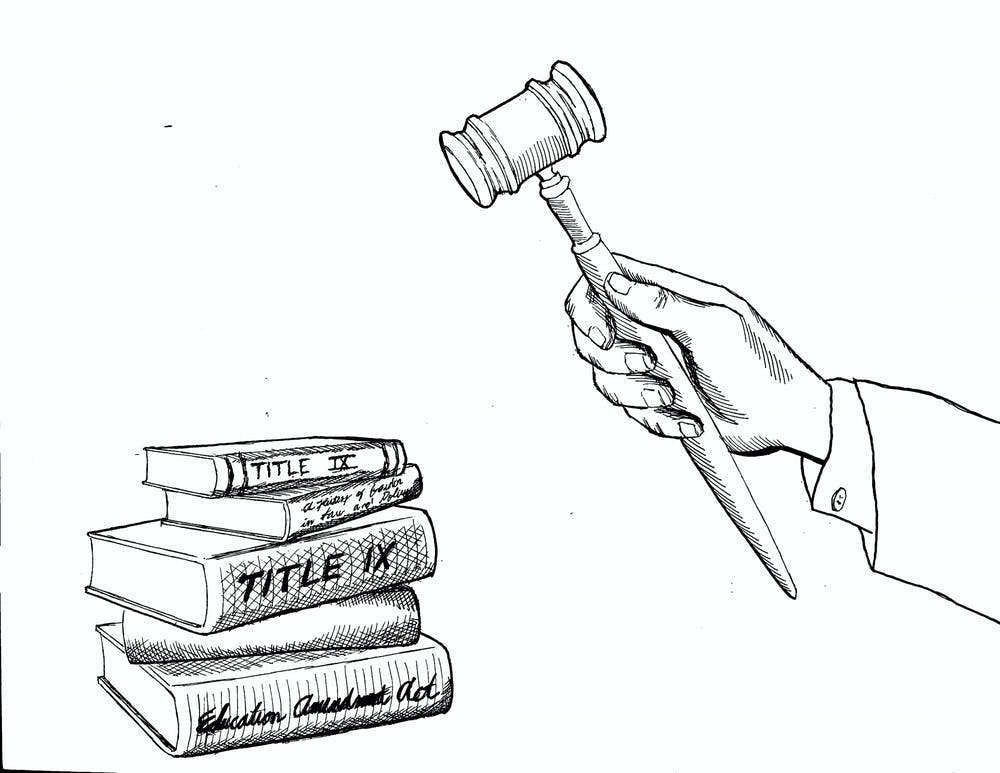A series of Title IX changes and proposals since the Biden administration took office in January 2021 has sparked discussion among policy experts and student activist groups on campus. Key changes include implementing protections against discrimination based on sexual orientation or gender identity and reversing some Trump-era Title IX policies.
Enacted in 1972, Title IX prohibits sex-based “discrimination under any education program or activity receiving federal financial assistance.”
Under Trump-era Title IX policies established by then-Secretary of Education Betsy DeVos, a sexual harassment investigation “can’t admit a statement by someone who can’t be cross-examined,” according to R. Shep Melnick, author of “The Transformation of Title IX: Regulating Gender Equality in Education.”
These policies required statements from victims and other witnesses to undergo cross-examination in a live hearing. This requirement drew criticism from students on campus when passed in spring 2020 for potentially discouraging victims from reporting cases of sexual misconduct, The Herald previously reported.
“You don’t want cross-examination to become another form of harassment,” Melnick said. “And you don't want it to become traumatic so that it will discourage people from reporting.”
The requirement was removed from Title IX under the Biden administration, according to an Aug. 24 letter from the Department of Education stating that “the department will immediately cease enforcement” of the Trump-era cross-examination rule.
Further changes expanded the statute’s protections. An interpretation notice from the Department of Education stated that discrimination based on gender identity and sexual orientation is prohibited under Title IX.
According to Vice President for Institutional Equity and Diversity Sylvia Carey-Butler, the Title IX Office worked with the Office of General Counsel to interpret the new guidance.
Carey-Butler added that the OIED expects additional rollbacks of Trump-era Title IX policies under the Biden administration in fall 2022.
While the Biden era changes are an improvement from previous Title IX guidelines, they still don’t adequately address the rates of sexual violence on campus, according to activist Carter Woodruff ’22, who spoke to the White House Gender Policy Council last year about online harrassment and abuse.
While DeVos’s Title IX changes reversed “many of the great strides the Obama Administration made toward providing justice for survivors, … the Obama-era guidelines themselves fell far below what I believe to be the bare minimum effort necessary to actually change the course of this public health crisis,” Woodruff wrote in an email to The Herald. “The Biden Administration has not expressed anything beyond an intention to revert Title IX regulations back to ones that parallel those from the Obama Administration.”
“The Biden Administration has taken a clear stance on how schools should interpret Title IX,” she added. “Visible leadership that models and makes clear expectations for institutions’ behavior … can make a big impact.”
But Woodruff remains doubtful that the changes demand enough of universities to substantially strengthen Title IX procedures on campuses.
“Until schools are federally required to take more substantive steps toward ending this public health crisis, I am pessimistic that any academic institutions, including Brown, would volunteer to bolster their Title IX offices and processes,” she wrote.
The changes also fail to address the scale of sexual violence against transgender students on campus, according to Amelia Wyckoff ’22, co-organizer of End Sexual Violence at Brown.
“Trans students face exponentially higher rates of sexual violence,” Wyckoff said. “Expanding sex discrimination to focus on LGBT communities is not enough. The only sort of legislation to actually help trans students on campus is trans-specific legislation.”
Even the existing protections for gender and sexual minorities are lackluster, according to Wyckoff, who added that some courts still do not include the new definition of sex discrimination in their rulings. The courts lack “the enforcement mechanisms to actually carry out these new definitions,” they said.
Melnick also questions whether Title IX itself is an effective medium to address the sexual violence epidemic.
Title IX “is highly ambiguous,” he said. “It has limited enforcement power and it’s enforced by a tiny agency in a tiny department. It’s not the most effective way to deal with these larger issues.”
While the Biden administration changes encourage universities to go beyond the minimum response established under Title IX, Melnick said that universities themselves do not enforce rules evenly across their student bodies.
“There are certain categories of students and staff that are not being adequately policed, and number one on that list is athletes,” Melnick said. “Schools are torn between their completely irrational prizing of athletics and their desire to do something to reduce sexual misconduct.”
According to Carey-Butler, the Title IX Office’s relationship with the Office of General Counsel acts as a check to ensure that “every student is treated the same … whether they are a medical student, an undergraduate, an athlete, whatever their status may be” at Brown.
“Will we make mistakes? Yes,” she said. “But do we have checks and balances in place? Absolutely. And that is the collaboration relationship that we have with (the Office of General Counsel).”
According to Wyckoff, the epidemic rates of sexual violence on college campuses demand change from university administrators nationwide beyond Title IX policy compliance.
“No law should be motivating you to take action,” Wyckoff said, addressing university administrators. “You should take action because huge percentages of your students are facing life-changing and life-altering and sometimes life-ending violence.”
“I have one big message for university presidents,” Melnick added. “Grow some courage and don’t continue to be a wimp … Don’t kowtow to the loudest constituency.”

Neil Mehta was the editor-in-chief and president of the Brown Daily Herald's 134th editorial board. They study public health and statistics at Brown. Outside the office, you can find Neil baking and playing Tetris.





